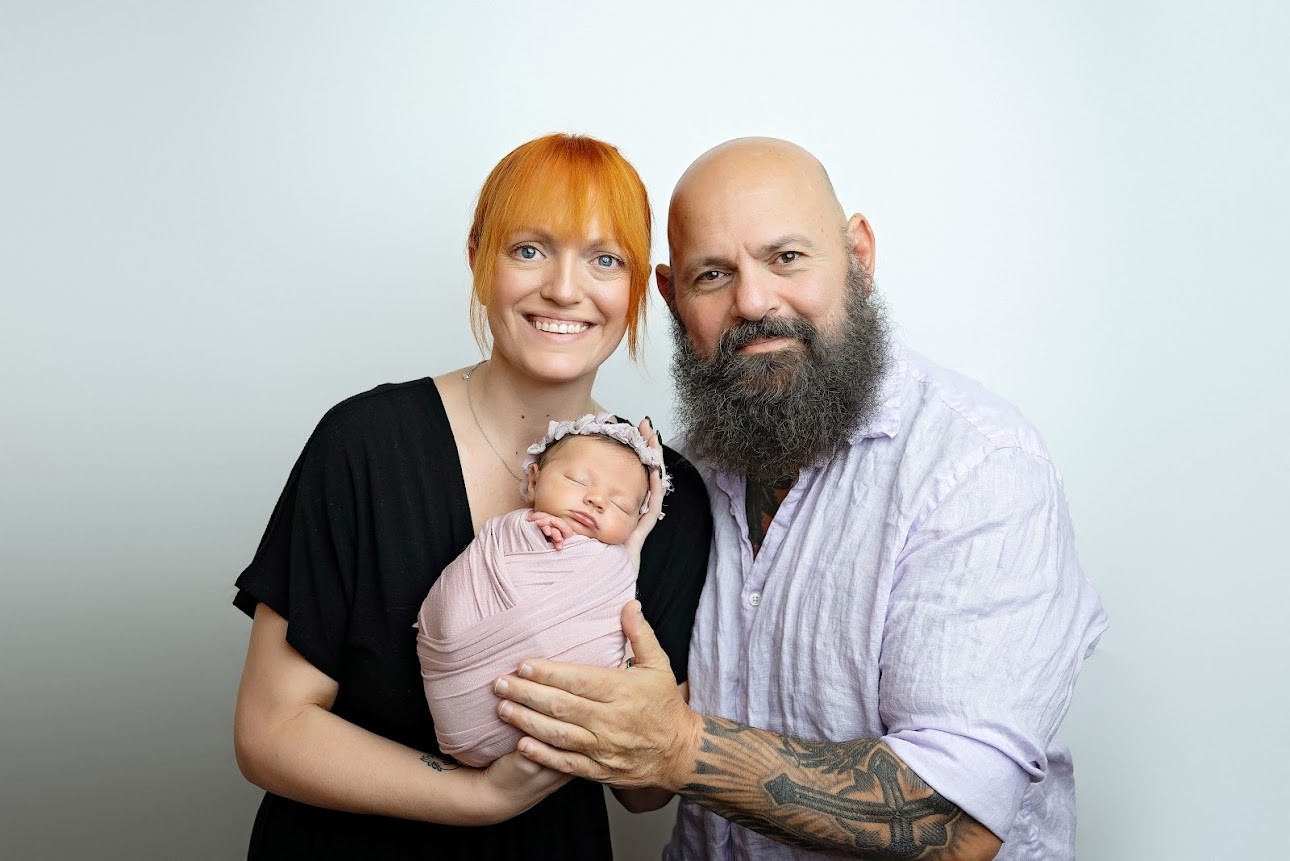You don't have to give up on parenthood because of Addison's disease. Many women with well-controlled adrenal insufficiency carry healthy pregnancies to term. But if you're dealing with frequent adrenal crises, unpredictable cortisol levels, or other complications that make pregnancy feel risky, there's a beautiful alternative: surrogacy gives you a safe, supported path to the family you've dreamed of.
We've walked alongside countless intended parents through complex medical journeys at American Surrogacy. Whether your doctor has recommended against pregnancy due to severe symptoms, you've lived through pregnancy-related adrenal crises, or you simply want the peace of mind that comes from evidence-based medical choices, we're here.
If you decide surrogacy is your path to building a family, know that every step of your journey comes with the medical expertise and emotional support you deserve.
Addison's Disease Pregnancy Safety: Risks and Complications
The answer depends entirely on how well your body manages the condition and how severe your symptoms are. Women with stable, well-managed Addison's often carry pregnancies successfully with careful medical monitoring.
However, if you have more severe adrenal insufficiency, experience frequent crises, or struggle to maintain stable cortisol levels, pregnancy can pose serious risks that deserve careful consideration.
When Addison's disease is poorly controlled or advanced, you face a much higher chance of life-threatening adrenal crises during pregnancy. These emergencies become more likely during times of physical stress—severe morning sickness, infections, labor, and delivery.
An adrenal crisis can cause dangerously low blood pressure, severe dehydration, and potentially fatal complications without immediate medical intervention.
Even well-controlled Addison's requires intensive management during pregnancy. You'll likely need constant medication adjustments, frequent monitoring by specialized endocrinology and maternal-fetal medicine teams, plus careful cortisol replacement therapy management. Some women find that pregnancy stress actually destabilizes previously well-controlled disease.
Situations that might make alternatives appealing:
- You've had frequent adrenal crises or hospitalizations
- Maintaining stable cortisol replacement feels like a constant struggle
- You're managing multiple autoimmune conditions alongside Addison's
- Previous pregnancies brought complications related to adrenal insufficiency
- Managing your condition during pregnancy causes severe anxiety
- Your body doesn't respond well to stress dose steroids
Complications that concern many women in higher-risk situations:
- Adrenal crisis triggered by pregnancy stress
- Severe electrolyte imbalances requiring emergency care
- Dangerously low blood pressure during labor
- Increased vulnerability to infections
- Your baby experiencing growth restriction or arriving preterm
- Higher miscarriage rates—research shows 43.8% for congenital adrenal hyperplasia compared to 27.3% for autoimmune Addison's disease, according to comprehensive multicenter research
If you fall into these higher-risk categories, the constant worry about complications can transform what should be a joyful pregnancy into an emotionally exhausting experience. Surrogacy offers more than medical necessity—it's a compassionate choice that puts both your wellbeing and your family-building dreams first.
Surrogacy for Addison's Disease: Medical Recommendations
Women with stable Addison's can often carry pregnancies successfully, but healthcare providers following current clinical practice guidelines frequently recommend surrogacy for those with more severe or unpredictable cases.
If your endocrinologist or reproductive specialist has voiced concerns about your specific situation, or if managing your condition has brought significant complications, surrogacy might offer your most secure path to parenthood.
The recommendation for surrogacy usually crystallizes when medical risks outweigh the benefits of attempting pregnancy. This especially applies if you've weathered multiple adrenal crises, struggle to maintain stable medications, or face other complicating health factors alongside Addison's.
Doctor-Recommended Surrogacy Criteria for Addison's Disease
Your doctor might suggest surrogacy if you experience:
- A pattern of severe or frequent adrenal crises
- Ongoing difficulty achieving stable cortisol replacement therapy
- Additional autoimmune conditions that complicate pregnancy
- Previous pregnancy complications directly related to adrenal insufficiency
- Severe gastroparesis or malabsorption that affects medication effectiveness
- Significant anxiety about pregnancy risks that impacts your mental health
- Premature ovarian insufficiency, which affects 10-20% of women with Addison's disease
Even well-controlled Addison's can grow more challenging with pregnancy's hormonal fluctuations and physical demands. The stress of constant medical monitoring, frequent dose adjustments, plus worry about potential complications can actually worsen symptoms and destabilize previously controlled disease.
Personal factors that might make surrogacy feel right for you:
- You strongly prefer to avoid high-risk pregnancy monitoring
- You're concerned about pregnancy stress impacting your condition
- You've had traumatic encounters with adrenal crises
- Your career or life circumstances make intensive monitoring difficult
- Your partner or family feels anxious about pregnancy risks
Choosing surrogacy in these situations allows you to prioritize your long-term health while still achieving your family-building goals. Rather than risking a potentially dangerous pregnancy, surrogacy offers a medically sound alternative that many healthcare providers recommend for patients with challenging autoimmune conditions.
Gestational Surrogacy: Preserving Genetic Connection with Addison's Disease
Something incredibly important to understand about surrogacy: it doesn't mean giving up your dream of a genetically related child. Through gestational surrogacy, you create embryos using your own eggs and your partner's sperm (or donor gametes if needed), which are then transferred to your surrogate's uterus for a healthy, protected pregnancy. Already have frozen embryos from IVF treatments? Those can be used directly in your surrogacy arrangement.
Many intended parents with Addison's find tremendous peace of mind knowing their child is developing in a protected environment while they focus on maintaining their own health and preparing for parenthood. Your genetic connection stays completely intact—your surrogate simply provides a nurturing, healthy environment for your baby without putting your health at risk.
American Surrogacy Matching Process for Medical Conditions
Time often matters when medical conditions influence your family-building journey. At American Surrogacy, we maintain relationships with pre-screened, qualified surrogates nationwide, allowing us to facilitate matches much faster than many other agencies.
Every surrogate in the program has completed thorough medical and psychological evaluations before becoming available for matching. When you're ready to move forward, we can typically present qualified surrogate candidates within 1 - 4 months months, rather than the 10-18 month wait times common elsewhere.
Pre-Screened Surrogate Database and Compatibility Assessment
The matching process includes:
- Pre-screened surrogate database enabling faster connections
- Complete medical and psychological evaluations already finished
- Compatibility assessments based on your unique needs
- Geographic preferences that minimize travel requirements
- Facilitated direct communication between you and potential surrogates
This efficiency matters especially for intended parents managing Addison's disease, allowing you to move forward with family-building plans without extended delays that might affect your long-term health management. The team understands the unique considerations when medical conditions necessitate surrogacy, and we work diligently to facilitate matches that feel right for everyone involved.
Surrogacy Costs for Addison's Disease: Complete Program Investment
Understanding the financial commitment surrogacy requires helps with planning, especially when medical conditions make it your most secure family-building option.
At American Surrogacy, complete programs typically range $100,000 - $200,000+, covering surrogate compensation, medical expenses, legal fees, and full program services throughout your entire journey.
Surrogacy Program Components: What's Included in Your Investment
Your investment typically includes:
- Surrogate base compensation ($45,000-$60,000)
- Complete medical expenses for surrogate and baby
- Legal representation for all parties involved
- Insurance review and coverage coordination
- Dedicated case management and program services
- Emergency fund covering unexpected expenses
While this represents a significant financial commitment, many intended parents appreciate knowing all potential costs upfront, with no hidden fees or surprise expenses.
These complete programs include dedicated assistance throughout the entire process, from matching through delivery and beyond—especially valuable when medical complexities are involved, as the team coordinates with your existing healthcare providers to ensure continuity of care.
Surrogacy Financing Options for Medical Necessity Cases
Surrogacy represents a substantial financial investment, and we're committed to helping intended parents explore every available financing option. Through a partnership with Sunfish, we offer specialized fertility financing designed specifically for surrogacy journeys, with loan amounts up to $300,000 and terms that make monthly payments more manageable.
Additional financing strategies to consider:
- Fertility-specific personal loans through specialized lenders
- 401(k) loans or hardship withdrawals for qualified expenses
- Health Savings Account (HSA) funds covering medical components
- Employer fertility benefits that may include surrogacy coverage
- Family assistance or crowdfunding campaigns
- Grants specifically designed for intended parents with medical conditions
Many intended parents find that combining multiple financing strategies makes surrogacy more accessible. For example, using HSA funds for medical expenses while securing a loan for surrogate compensation can reduce the overall amount you need to borrow.
Financial coordinators work with intended parents to explore all available options and create financing plans that fit specific situations. Starting early matters, as some options like fertility grants have application deadlines and waiting periods.
Emotional Support for Medical Surrogacy Decisions
Choosing surrogacy for medical necessity requires compassionate assistance and deep understanding. Many intended parents with Addison's face complex feelings about not carrying their own pregnancy, even when they intellectually understand surrogacy is the most secure choice.
Access to counselors who specialize in third-party reproduction and understand the unique emotional challenges faced by intended parents with medical conditions comes with your program, helping you process feelings of loss about original pregnancy plans while embracing the positive aspects of your surrogacy journey.
Addison's Disease Support Resources and Community
Resources we recommend:
- Individual counseling with reproductive psychologists
- Groups designed for intended parents using surrogacy
- Online communities like the Addison's Disease subreddit
- RESOLVE: The National Infertility Association groups
- American Surrogacy's exclusive intended parent network
Connecting with other intended parents who've made similar decisions offers particular value. Many find comfort learning from others who've successfully built families through surrogacy while managing chronic health conditions, often developing lasting friendships that provide ongoing encouragement.
We're committed to ensuring you feel emotionally prepared and well-equipped throughout every phase of your surrogacy experience, from decision-making through welcoming your baby home.

2 Months

1 Month

3 Weeks
American Surrogacy: Your Partner for Addison's Disease Family Building
Your journey to parenthood doesn't need to be limited by Addison's disease. Surrogacy offers a medically sound, emotionally nurturing path to the family you've always envisioned, without compromising your health or wellbeing.
Our team understands the unique considerations when chronic health conditions necessitate surrogacy. We're here to answer your questions, discuss your specific situation, and help you understand how surrogacy could be exactly right for your family.
Schedule Your Free Consultation Today
Disclaimer: The information provided in this article is for educational and informational purposes only and is not intended as medical advice. American Surrogacy does not provide medical services and does not make clinical determinations regarding eligibility for fertility treatments or surrogacy. All medical evaluations and decisions should be made in partnership with licensed medical professionals.